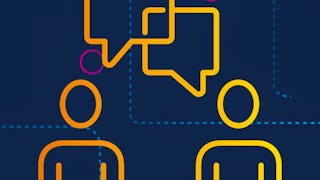This course focuses on participatory approaches in research, known as 'public involvement' in the UK. You'll specifically, consider why citizens and patients would be involved in research and explore participatory approaches across and within the research cycle in more detail, diving into questions such as:
通过 Coursera Plus 解锁访问 10,000 多门课程。开始 7 天免费试用。


您将获得的技能
要了解的详细信息

添加到您的领英档案
4 项作业
了解顶级公司的员工如何掌握热门技能

积累特定领域的专业知识
- 向行业专家学习新概念
- 获得对主题或工具的基础理解
- 通过实践项目培养工作相关技能
- 获得可共享的职业证书

该课程共有4个模块
Welcome to Module 1! Over the next 4 modules, you'll focus on how citizens and patients can be involved in research from the researcher side. You'll explore participation across and within the research cycle (as we refer to it) in more detail, specifically, what kinds of participatory approaches can be undertaken at each of the 7 stages of the research cycle. Although these modules have a public health focus, the approaches and ways of involving citizens and patients across and within the research cycle apply to other disciplines and kinds of research too (even basic research – although it can be slightly more challenging!). First, you need to be clear about the definitions we use, so let’s start there.
涵盖的内容
2个视频9篇阅读材料1个作业2个讨论话题5个插件
Welcome to Module 2. You will now dive down into participatory approaches taken in the UK in publicly funded health research which are framed around the 7 stages of the ‘research cycle’ (as we call it). You will learn why involving citizens and patients in research is valuable, how you might go about involving people at the different stages of the research cycle and hear about case studies and examples of how this has been done in the real world. In Lesson 1, you will look at the role of public involvement and co-production throughout the first stage of the research cycle (Identifying and Prioritising), review some methodologies which can be used to identify and prioritise research topics and hear about some examples. In Lesson 2, you will look at the role of public involvement and co-production throughout the second stage (Designing and Managing) and third stage (Funding and Commissioning) of the research cycle and hear about how citizens and patients have been involved at these stages.
涵盖的内容
3个视频8篇阅读材料1个作业2个讨论话题2个插件
Welcome to Module 3! In Lesson 1, you'll look at the role of public involvement and co-production throughout the fourth stage of the research cycle (Undertaking and Analysing). Qualitative research (collecting and analysing non-numerical data) might seem the most obvious kind of research in which to involve citizens and patients as co-researchers - e.g. in interviews and surveys. However, you're going to study some other examples where citizens and patients can inform the “doing” of research - for example, systematic reviews. In Lesson 2, you'll look at the role of public involvement and co-production throughout the fifth stage and the sixth stages of the research cycle (Disseminating) and (Implementing) respectively. You'll also hear about how citizens have been involved at these stages.
涵盖的内容
2个视频10篇阅读材料1个讨论话题7个插件
In this module, you will learn about the ways to evaluate public involvement and co-production in health research (stage 7 of the research cycle). Jack Jacques gives an interview in which he talks about his experience with evaluating the impact of public involvement - we encourage you to listen to this. You also have the opportunity to decide on an evaluation tool which can be applied to your own setting - you'll write a short summary justifying why you'd choose the tool and evaluating its strengths and limitations.
涵盖的内容
3个视频4篇阅读材料2个作业1个讨论话题1个插件
获得职业证书
将此证书添加到您的 LinkedIn 个人资料、简历或履历中。在社交媒体和绩效考核中分享。
从 Public Health 浏览更多内容
 状态:免费试用
状态:免费试用Imperial College London
 状态:免费试用
状态:免费试用Imperial College London
 状态:预览
状态:预览University of Rochester
 状态:免费试用
状态:免费试用Imperial College London
人们为什么选择 Coursera 来帮助自己实现职业发展




学生评论
18 条评论
- 5 stars
66.66%
- 4 stars
27.77%
- 3 stars
0%
- 2 stars
5.55%
- 1 star
0%
显示 3/18 个
已于 Feb 21, 2024审阅
the overall course design is good and informative. I will suggest a summary table for each week should be provided after we pass the final test.
已于 Oct 15, 2023审阅
Great introduction to PPI and very helpful ideas for anyone new to research
常见问题
To access the course materials, assignments and to earn a Certificate, you will need to purchase the Certificate experience when you enroll in a course. You can try a Free Trial instead, or apply for Financial Aid. The course may offer 'Full Course, No Certificate' instead. This option lets you see all course materials, submit required assessments, and get a final grade. This also means that you will not be able to purchase a Certificate experience.
When you enroll in the course, you get access to all of the courses in the Specialization, and you earn a certificate when you complete the work. Your electronic Certificate will be added to your Accomplishments page - from there, you can print your Certificate or add it to your LinkedIn profile.
Yes. In select learning programs, you can apply for financial aid or a scholarship if you can’t afford the enrollment fee. If fin aid or scholarship is available for your learning program selection, you’ll find a link to apply on the description page.
更多问题
提供助学金,





